Diversity

This year marks the 150th anniversary of both the issuing of Emancipation Proclamation and the battle of Gettysburg. This month marks the 50th anniversary of the historic March on Washington and Dr. Martin Luther King, Jr.’s “I Have a Dream” speech. All three moments marked major turning points in the fundamental American struggle to actualize the divine dream of life, liberty, and equality for all. That dream has been especially powerful through the struggle for African-American freedom.
From a biblical perspective, American slavery and Jim Crow segregation not only subjugated the body. For about 300 years, from Virginia’s first race-based slave laws in the 1660s to the passage of the Voting Rights Act in 1965, the legal binding of black hands, feet, and mouths also bound spirits and souls. Both slavery and Jim Crow laws denied the dignity of human beings made in the image of God and forbade them from obeying God’s command to exercise Genesis 1:28 “dominion” — in today’s terms, human agency.
So, the Emancipation Proclamation and passage of the 13th, 14th, and 15th Amendments were cause for jubilee worship in black churches and among other abolitionists. Likewise when the Civil Rights Act passed in 1964 and the Voting Rights Act passed in 1965, churches across the nation erupted again in worshipful jubilee.
Now, nearly 50 years after the second American jubilee, African Americans are being stripped of dignity and constitutionally protected freedoms like we have not seen since Jim Crow.
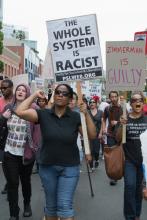
Several years ago, Michael Emerson and Christian Smith criticized the quick-fix approach to racism found in the evangelical race reconciliation movement. They noted that evangelicals tended to address systemic racism through promoting interracial interactions at one-time events such as Promise Keepers rallies. Ironically, this approach tended to increase rather than decrease racism because it gave white evangelicals just enough exposure to people of color to think they now understood race without enough systemic interaction to expose them to the endemic nature of racism. They suggested instead that the preferred response was to engage in political and legal advocacy in order to change the institutional nature of racism. However, what they failed to address in that book is that political and legal approaches to race often suffer from the same quick-fix approach.
Today, we see the same quick-fix dynamics in the outcome of the George Zimmerman trial. Some are focusing again on developing interracial interpersonal relationships, while other evangelical groups have focused on legal advocacy. But in our rush to promote a “solution,” we may end up creating more harm than good. I believe evangelicals have the possibility of addressing racial injustice in a more creative way that could get more closely to the roots of the problem if we took the time to think creatively.
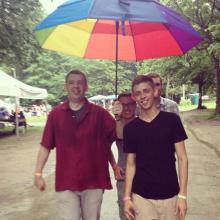
I woke up this morning in a damp sleeping bag to the sound of a rushing river. I heard the laughter of children and could smell bacon being fried in a tent not far from mine. I opened the tent flap and walked outside. As I looked around, I saw dozens of men and women who had also just rolled out of their sleeping bags and RVs to welcome the new day. I saw rainbow flags flying next to signs that read “Who would Jesus Torture?” and “Pro-Peace, Pro-Life, Be Consistent.”
As I began the short trek from my tent to the shower-house, I was greeted by dozens of people who I had never personally met but felt like I knew intimately. All of us had gathered to encourage and provoke one another to do justice, love mercy, and walk humbly with our God. Over the course of this weekend, dozens of presenters spoke to crowds who listened intently to their dynamic messages of reformation, renewal, redemption, and action. From the testimony of a tattooed Lutheran pastor to the ground-breaking theological theories on non-violence from a highly regarded gay Catholic priest, from the wisdom of one of the founding fathers of the Civil Rights Movement to a quirky live radio show hosted by one of the founders of the Emergent Church movement, hundreds of people from across the country and indeed around the world had converged for this little slice of heaven on earth known as the Wild Goose Festival.
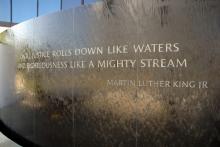
I was born in 1969 and thus am in the first generation of African-Americans to grow up with laws and policies that say to the rest of America that I am equal. I saw housing opportunities open up for me as my parents “broke the block” and became the first African-Americans to move onto an all-white block in the East Mt. Airy section of Philadelphia in 1970. I saw educational opportunities open up such that I was able to attend a nearly all-white private, college-prep high school in the suburbs. This was the fruit of the Civil Rights movement in my life growing up in the 1970s and 80s.
Soon hundreds of thousands will gather on the National Mall to commemorate the 50th anniversary of the March on Washington for Jobs and Freedom where the Rev. Dr. Martin Luther King gave his iconic “I Have a Dream” speech. That speech lived on for me in classrooms and in speech competitions and was etched on my heart so that I would carry that dream into the future.
The recent decisions by the U.S. Supreme Court to gut the enforcement section of the 1965 Voting Rights Act and the decision of the jury in the George Zimmerman trial have left me wondering about the dream, worried that it is under attack and worries that professed Christians are among those helping lead those attacks.
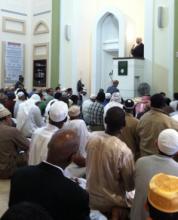
In their holiday Eid al-Fitr khutbas, or sermons, on Thursday many imams across the country noted a growing climate of acceptance in America but urged Muslims not to forget the problems facing their communities in the U.S. and overseas.
“The Eid khutba is like the State of the Union address,” said Oklahoma-born convert Suhaib Webb, imam of the Islamic Society of Boston Cultural Center, the biggest mosque in New England, to an overflowing crowd — men dressed in crisp robes, tunics, and three-piece suits, women in black abayas, long floral wraps, and colorful headscarves.
“Our community is at a unique crossroads,” Webb said, issuing a call for older Muslim generations to allow younger generations to have greater roles in community affairs. “There are a lot of young people with a lot of excitement, and a lot of old people with a lot of fear. And that’s not a healthy thing.”

WASHINGTON — What’s one way to ensure that a new Hebrew-immersion public charter school isn’t a Jewish school? Hire a priest to run it.
Sela, which means “rock” or “foundation” in Hebrew, opens in Washington, D.C., on Aug. 19. As a public school, Sela may not teach or show preference to any religion. But the intimate connection between Hebrew and Judaism makes some people wonder whether the separation is truly possible.
The question is not just for Sela, but for the dozen or so other public Hebrew charter schools from Brooklyn, N.Y., to San Diego that have started since the first one opened in Florida in 2007. And more Hebrew language charters are in the design stage.
Making things even more complicated is Hebrew’s ties not only to Judaism but to Israel. When the Sela staff began naming classrooms for major cities in Israel this summer, the school’s executive director, Jason Lody, said there would be no class named after the disputed capital of Jerusalem.
“We want to be a public school of excellence,” Lody said. “We don’t want to be sidetracked by political conversations that don’t focus on getting our 4-year-olds ready for kindergarten.”
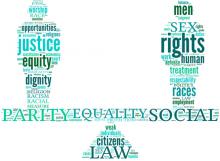
Adaptation is how a bitter and broken South survived its own worst instincts after the war. Progressive pockets emerged in college towns and later in large cities. Hungry for Northern business, the region became less racially polarized. In time, a black man could become mayor of Atlanta and another could become the Episcopal bishop of North Carolina.
The Rev. Martin Luther King, Jr.’s dream of 50 years ago came to seem possible. Distant, yet possible.
But now the dream has receded. The fact of a black president seems to have reopened a pulsing vein of racism. Operating under cover of fiscal austerity, vengeful state politicians are gutting decades of programs that helped the South move forward by helping blacks and Latinos to have a chance.
No more affirmative action, they say; no more dark-skinned citizens flocking to voting stations; no more voting districts shaped by fairness; no more protections from ground-level aggression against people of color.
Once again, as happened in the 19th century, impoverished whites who should be lining up to resist predatory behavior by the moneyed class are being turned against their own best interests by race politics.
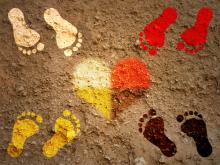
I was in my office on a quiet afternoon when I saw the car pull into the parking lot.
Those of us who work in churches are familiar with people stopping by seeking a bit of financial help. But people stop by churches for lots of reasons. It’s best to wait to see what they want before making assumptions.
As I watched the African-American gentlemen get out of his car, I sighed. My peaceful afternoon was going to be interrupted by yet another request for help. We could do that, but it would take some time. He came into the church and I greeted him.
“Hi, how are you?”
“Fine,” he said. “But I think I’m lost. I’ve got this appointment at a business near here, but I think I missed a turn. Can you help me figure out where it is?”
So why did I assume he was looking for a handout? The only variable was the color of his skin. And in that moment, I realized how quickly I make judgments about people based on stereotypes that lurk within me. And I was grateful that I had kept that stereotype to myself when I greeted the man.
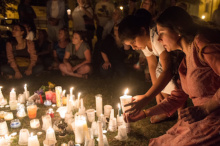
It all sounds so… demanding. Sell your possessions and give to the poor. “Be dressed for action." Imagine yourselves as slaves who remain ready for their master’s return — not knowing when it might come.
Luke’s Gospel is big on demanding. In Luke 9:57-62, Jesus encounters three would-be disciples. And each receives a warning that would vanquish enthusiasm like an ice-cold shower.
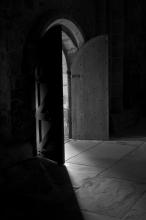
It is not very difficult to understand why there is a black church and a white church in America today, or to realize that this structure will not change in the near future. The religious atmosphere created by the coming together of blacks (who were slaves) and whites (who were masters) tended to negate any possibility of developing the true unity and oneness that scripture proclaims for the church. The agendas of the slaves were vastly different from those of the masters. Unfortunately, conflict over agendas, both stated and unstated, continues to be one of the reasons that blacks and whites do not come together to worship.

Rather than a Third Great Awakening I believe we are standing in the threshold of a Great Grace Awakening. It’s a move of the Holy Spirit drawing people away from legalistic and fear-based beliefs to a place some of us would call grace.
On the surface, it may seem to fly in the face of some traditional Judeo-Christian ethics. But it is aligned with a broader, more universal ethic that seems to be developing around genuine Christian love and grace — the very essence of Jesus’ ministry and what makes it so revolutionary — as guiding principles.
Grace is the reason for the incarnation. God became human and walked in our sandals because God knows us and wants us to be known.
Grace says that there is nothing we could ever do that would make God love us less. And grace tells us that there’s nothing we could ever do that would make God love us more. You are loved simply because you are and for all of who you are. Full stop.
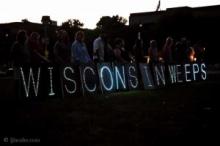
One year after a gunman opened fire in a Sikh temple in Oak Creek, Wis., killing six worshippers, Sikhs say they are hopeful about the future and even more determined to be better understood.
“The legacy of Oak Creek is not one of bloodshed,” said Valarie Kaur, founding director of the interfaith group Groundswell, a project of Auburn Seminary in N.Y.
“[It’s of] how a community rose to bring people together to heal and to organize for lasting social change,” she told the PBS television program “Religion & Ethics NewsWeekly.”
![U.S. Secretary of State John Kerry shakes hands with Raymond Kelly. Photo courtesy U.S. Department of State, via Wikimedia Photo courtesy U.S. Department of State [Public domain], via Wikimedia Commons](https://sojo.net/files/styles/medium/public/blog/512px-U.S._Secretary_of_State_John_Kerry_shakes_hands_with_Raymond_Kelly_Commissioner_of_the_New_York_City_Police_Department_NYPD-427x284.jpg)
Muslim-American groups are mounting a growing campaign to quash the potential nomination of New York City Police Commissioner Raymond Kelly as the next secretary of the Department of Homeland Security.
Muslims say that as head of the nation’s biggest police force, the commissioner oversaw a spying program that targeted Muslims based solely on their religion, showed poor judgment by participating in a virulently anti-Islamic film, and approved a report on terrorism that equated innocuous behavior such as quitting smoking with signs of radicalization.
Homeland Security chief Janet Napolitano announced she is resigning in September to become president of the University of California system.
“Mr. Kelly might be very happy where he is, but if he’s not, I’d want to know about it, because obviously he’d be very well qualified for the job,” President Barack Obama said in a July 16 interview with Univision.
Muslims are particularly indignant because Obama said on numerous occasions that he would work to end profiling.
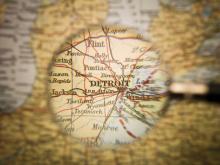
Eventually, Butch invited me to come to his home and meet his family. I felt deeply honored and very eager to go. But every time I asked him to write directions to his place, he would change the subject. Finally one day with pen and paper in hand, I sat him down and said, "Look, Butch, how do you expect me to get to your house if you don't write out directions for me?"
Awkwardly he began to scribble on the paper. I was deeply sad when I realized the reason he had hesitated before was that he could barely write; I was ashamed at my insensitivity.
That small incident was very significant to me. I went home that night and both cried and cursed. I could not believe that someone as bright as Butch had hardly been taught to write. I was furious at a system that had given me so much and him almost nothing, simply by virtue of our skin color. By accident of birth, I had all the benefits and he all the suffering. I vowed again through angry tears to do everything I could to change that system.
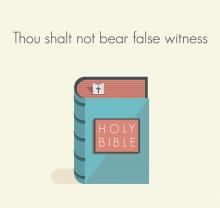
"And God spoke all of these words…You shall not give false witness against your neighbor." Exodus 20:1, 16
Several months back I overheard a conversation in an office waiting room. A young, 20-something guy entered the waiting room with his board shorts on and his windblown hair haphazardly tucked beneath his backwards baseball cap as though he’d just come in from surfing – not uncommon in the beach community of Jacksonville, Fla. He strolled confidently to the receptionist and asked her a question about the availability of a person he wanted to see, made an appointment, and it seemed his business was done and he’d be on his way. Instead he asked the receptionist where she was from, if she liked her job, and then talked about the weather. He then began to tell her about a Bible study he was leading and a little about his faith journey – for the longest time he felt lost, was starting to get in trouble, then he found Jesus, was born again, and began to set his life straight.
After sharing his testimony he asked the receptionist, “What religion are you?"

Beneath the shade of a pavilion, a group of children discuss the difference between atheism and agnosticism.
Most campers participating in this woodsy Socrates Cafe identify as atheists — one was raised Mormon, another said she would feel comfortable changing her views if she found reason to believe in God.
And then, the voice of a teenage boy: “I feel as if I’m too young to decide,” he said, adding that he’s still exploring his options, evaluating the evidence.
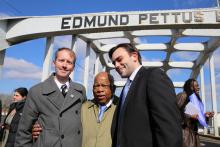
It may have taken a little bit of prodding — a little ‘you-want-me-to-do-what?’ and a lot of faith — but in the end, Congressman John Lewis agreed to go along with staffer Andrew Aydin’s out-of-the-box idea. The result: March (Book 1) — the first of a three-part graphic novel autobiography chronicling Lewis’ life and the Civil Rights Movement.
“The story of the movement that we tell is very much John Lewis’ story in this first book,” Aydin said. “It is a story of him growing up poor, on a farm, and it builds to a climax of the national sit-in movement.”
Lewis certainly has a lot to tell. He and other activists famously were beaten by police on the Edmund Pettus Bridge in Selma, Ala., in 1965 during an attempted march for voting rights — an event that became known as “Bloody Sunday.” He served as chairman of the Student Nonviolent Coordinating Committee during the height of the movement, spoke at the historic March on Washington alongside Dr. Martin Luther King, Jr., and was instrumental in the passage of the Voting Rights Act of 1965.
Aydin, who co-wrote the book with Congressman Lewis, and illustrator Nate Powell sat down with Sojourners to explain how the series came about and why it is such an important story these 50 years later.

WHO ARE WE? WHERE ARE WE GOING? And how are we going to get there? We can no longer answer these questions. Indeed, we have stopped asking them. But just as the future of blacks seemed to be in peril when integration was introduced decades ago, our future as a viable racial and ethnic group in this country will be greatly diminished unless a new model for racial and cultural development is established.
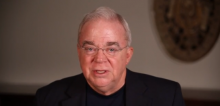
Jim Wallis sat down after the George Zimmerman verdict earlier this month to give his thoughts on race, faith, and truth.
"We live in our different worlds. That's not what we're supposed to do as the body of Christ."
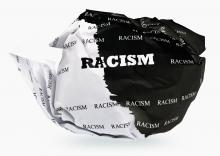
IN SPIRITUAL AND BIBLICAL terms, racism is a perverse sin that cuts to the core of the gospel message. Put simply, racism negates the reason for which Christ died—the reconciling work of the cross. It denies the purpose of the church: to bring together, in Christ, those who have been divided from one another, particularly in the early church's case, Jew and Gentile—a division based on race.
There is only one remedy for such a sin and that is repentance, which, if genuine, will always bear fruit in concrete forms of conversion, changed behavior, and reparation. While the United States may have changed in regard to some of its racial attitudes and allowed some of its black citizens into the middle class, white America has yet to recognize the extent of its racism—that we are and have always been a racist society-—much less to repent of its racial sins.